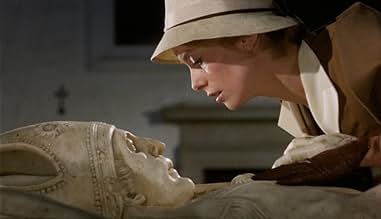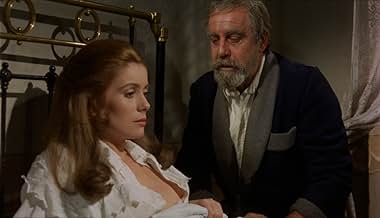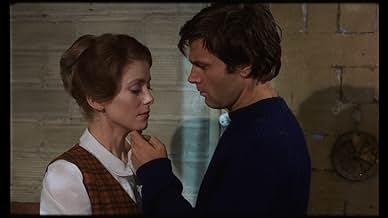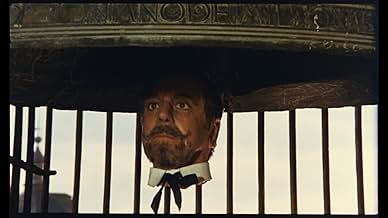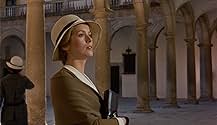IMDb रेटिंग
7.4/10
14 हज़ार
आपकी रेटिंग
अपनी मां की मृत्यु के तुरंत बाद, एक मासूम और युवा महिला को अपने मध्यम आयु वर्ग के कुलीन अभिभावक के घर में शरण मिलेगी.अपनी मां की मृत्यु के तुरंत बाद, एक मासूम और युवा महिला को अपने मध्यम आयु वर्ग के कुलीन अभिभावक के घर में शरण मिलेगी.अपनी मां की मृत्यु के तुरंत बाद, एक मासूम और युवा महिला को अपने मध्यम आयु वर्ग के कुलीन अभिभावक के घर में शरण मिलेगी.
- निर्देशक
- लेखक
- स्टार
- 1 ऑस्कर के लिए नामांकित
- 11 जीत और कुल 4 नामांकन
Mary Paz Pondal
- Muchacha
- (as María Paz Pondal)
Juanjo Menéndez
- Don Cándido
- (as Juan José Menéndez)
फ़ीचर्ड समीक्षाएं
One of the better melodramas by Bunuel that stars Catherine Deneuve --Belle De Jour was the most successful. Tristana is the third installment to Bunuel's ill-fated heroine yarn: as we know, Viridiana and Belle De Jour were the first 2. Nevertheless, the film's not as surreal as these previous two films; however, Bunuel still maintains his use of dream sequences and familiar motifs. Rey is excellent as the lecherous uncle, and Deneuve is also good as the title character. Bunuel has definitely excelled in focusing on the aesthetic approach to a story-line; however, this respect can be overwhelming for some viewers, especially those who are more comfortable with the fast-paced American movies. In short, Tristana is still an excellent movie regardless of these unusual aspects.
I like all films by Buñuel, and I don't think any of his films are boring. Yet, even if they could be very remarkable, some films are much "cheaper", less perfect than others, maybe because they were on a more limited budget. Tristana, though, is one of the perfect ones, in terms well-made:ness. I haven't got much to complain about this film. There is only one piece of music, and obviously Buñuel didn't put much music in his films, but it's acceptable, perhaps a good thing. The acting is very good. Rey is very good. I find the most impressive things to be the script and the dialog, which are fantastic.
Not the most surrealistic work, yet, probably one of Buñuel's ten most well-made.
Not the most surrealistic work, yet, probably one of Buñuel's ten most well-made.
One of the latest works from the genius of Calanda, he was still stigmatized by Franco's dictatorship and he adapted a text by Benito Pérez Galdós about a young pretty girl (Catherine Deneuve) whose mother dies and has to go to live (and something else) with his stepfather (Fernando Rey).
"Tristana" contains many of the common factors of Buñuel's movies: his total contempt for the ruling sectors of society and the rich people, for hypocrisy and Puritanism; his irreverence, and a wicked and implicit sexual content. Only the man who made "Belle de Jour" would dare to amputate a leg to the goddess Deneuve (one of the most beautiful creatures that ever walked the earth). Fernando Rey plays a typical Spanish "hidalgo" that's come down in the world and that sexually harass his stepdaughter.
So, Buñuel not only hadn't lost his touch with the years, on the contrary, he felt more and more free as the time went by to let his genius flow *My rate: 8/10
"Tristana" contains many of the common factors of Buñuel's movies: his total contempt for the ruling sectors of society and the rich people, for hypocrisy and Puritanism; his irreverence, and a wicked and implicit sexual content. Only the man who made "Belle de Jour" would dare to amputate a leg to the goddess Deneuve (one of the most beautiful creatures that ever walked the earth). Fernando Rey plays a typical Spanish "hidalgo" that's come down in the world and that sexually harass his stepdaughter.
So, Buñuel not only hadn't lost his touch with the years, on the contrary, he felt more and more free as the time went by to let his genius flow *My rate: 8/10
I can't say I know Luis Bunuel's style well, since I've not seen many of his works, and those that I've seen usually just struck me as blah. But then yesterday I saw Tristana which starred Catherine Deneuve and was awe-struck by it. See, the comments that I've read online about it have seem to have the focus all wrong, they are more interested in commenting on Bunuel's usual attack on the bourgeois and catholicism. Yes it is dark and in some places rather surreal, but above all, Tristana is a simple and sad story about its characters as they grapple with life, love, loss and regret. It is especially well-crafted with its sinewed study of human relationships, and humans that desperately try to relate with each other.
Tristana, played brilliantly by Catherine Denueve, is the central character whom we see evolve from an innocent young girl with her many ideals about love and relationship, to a bitter and cynical woman at the film's end who cannot believe in anything any longer. It is with special finesse that Deneuve plays her, that we witness, with heartbreak, every turn of her back on the things she love, and every rejection of all morality that she held before.
Fernando Rey's character is probably the murkiest but ultimately most empathetic character, as at the end of the film, age wears off his hard-edged cynicism and turns him into the loving father figure that Tristana desperately needed in the beginning of the film. In a sense, it is a film about age, how when we reach a certain point in our lives we see things much clearer and as it is, rather than try to twist things to our advantage. The way Rey's character treasures the time with the vile and vindictive Tristana at the end of the film is not only overwhelmingly sad, but also an epiphany by an auteur who is gaining age himself.
In spite of all its dramatic turns of events, Tristana is not an emotional and angsty film in its portrayal of its characters' lives. Instead it is a soft and peaceful film that sympathetically accepts its characters' flaws as much as it forgives them. It is a film that evokes the intricate feeling of looking back in our dark and troubled past and finding the exquisite moments of happiness amidst all the cynicism and grit. When, towards the end, Rey reaches the peace that he has been struggling so hard to attain throughout the film, he notes, 'It's snowing so hard outside, but in this house, I'm nice and warm. What's there not to be happy about?'. A silent recognition that peace is not bending reality to your own will, but merely, acceptance.
Tristana, played brilliantly by Catherine Denueve, is the central character whom we see evolve from an innocent young girl with her many ideals about love and relationship, to a bitter and cynical woman at the film's end who cannot believe in anything any longer. It is with special finesse that Deneuve plays her, that we witness, with heartbreak, every turn of her back on the things she love, and every rejection of all morality that she held before.
Fernando Rey's character is probably the murkiest but ultimately most empathetic character, as at the end of the film, age wears off his hard-edged cynicism and turns him into the loving father figure that Tristana desperately needed in the beginning of the film. In a sense, it is a film about age, how when we reach a certain point in our lives we see things much clearer and as it is, rather than try to twist things to our advantage. The way Rey's character treasures the time with the vile and vindictive Tristana at the end of the film is not only overwhelmingly sad, but also an epiphany by an auteur who is gaining age himself.
In spite of all its dramatic turns of events, Tristana is not an emotional and angsty film in its portrayal of its characters' lives. Instead it is a soft and peaceful film that sympathetically accepts its characters' flaws as much as it forgives them. It is a film that evokes the intricate feeling of looking back in our dark and troubled past and finding the exquisite moments of happiness amidst all the cynicism and grit. When, towards the end, Rey reaches the peace that he has been struggling so hard to attain throughout the film, he notes, 'It's snowing so hard outside, but in this house, I'm nice and warm. What's there not to be happy about?'. A silent recognition that peace is not bending reality to your own will, but merely, acceptance.
It might appear to the uninitiated that Luis Bunuel is making with Tristana at first a good but very predictable melodrama that turns somewhere in the second half mark into a strange power-play of desire turned on its head. But in reality, when looking at it after seeing a couple of his films, Bunuel's work with Tristana is somehow kind of touching. He cares about all of his characters- none of whom what they seem or dumbed down to Lifetime movie levels- and in this stuck-in-its-ways society there are boundaries that are crossed in tragic means. Usually one might expect some dark or subtle comedy of manners or satire on society, but here it's stripped away, as it was for some of Viridiana, and all that's left is a spare, tense and expertly manipulated tale where the tables are turned once or twice on the couple of Don Lope (Fernando Rey) and Tristana (Catherine Deneauve, maybe her most physically demanding of her two Bunuel roles).
One thing that's extraordinary about how Bunuel directs and allows for his actors to play the scenes is that the emotions are only heightened to a certain level, and never with the aid of things like music or tears. It is what it is: Don Lope has taken care of Tristana as her guardian since her mother died, and now has inserted himself as her father/husband figure, with his servant Saturna (stern-faced but understanding Lola Gaos) a kind of unofficial confessional. Tristana wants some freedom, just to go out and walk around, and feels caught by Don Lope even when not doing anything... until she meets Franco Nero's Don Horacio, a painter who could promise a new life. This goes without saying that one should take it for granted that Tristana isn't *that* young and could take care of herself without Lope, but maybe this is part of the point of the slight absurdity- and eventual tragedy- of this struggle.
Two years go by after she leaves Lope for Horacio, with a tumor in her leg. She's now a cripple, and now once again a kind of mental prisoner in Lope's home; the complexity of old man Lope as being duplicitous is seen right after he finds out she's sick and Horacio asks for Lope to help keep her home, and he nearly skips home saying "she'll never leave again!" All of this, leading up to a final twist that is very satisfying if extending the tragic dimension of Lope and Tristana, would be soapy and tawdry and, possibly, very standard in other hands. For Bunuel, there's a lot of personal ground here; I wonder at times if Rey is a little like one of those actors a director of Bunuel's auteur-stature uses as a means of expressing himself through an actor, or if it's just because he's so good at playing wicked AND sympathetic bourgeois. And the mixture of ideas, if not really themes, covering what's love and over-control, religion, deformity, a free will are potent and exciting even in such subtle and (as Maltin said) serenely filmed territory.
It's also a minor triumph for Deneuve, who between this and Belle de jour did some of her best work as an actress for the notorious surrealist. Her character's continual dream of Lope's beheaded top dangling from a church tower is the closest we see to a classic surrealist scene, though it's reminiscent of Los Olvidados as brilliantly expressing one character's mind-set. Deneuve is up for the challenge of putting up a tough interior and exterior presence; she gets paler towards the end (if this was for real or just a bad print I couldn't tell), and there's a lot of pain in her eyes and expression throughout. It's great work for one of the director's most subtly demanding works- beneath its conventional framework of a love-triangle story is sorrow and horror at the human condition.
One thing that's extraordinary about how Bunuel directs and allows for his actors to play the scenes is that the emotions are only heightened to a certain level, and never with the aid of things like music or tears. It is what it is: Don Lope has taken care of Tristana as her guardian since her mother died, and now has inserted himself as her father/husband figure, with his servant Saturna (stern-faced but understanding Lola Gaos) a kind of unofficial confessional. Tristana wants some freedom, just to go out and walk around, and feels caught by Don Lope even when not doing anything... until she meets Franco Nero's Don Horacio, a painter who could promise a new life. This goes without saying that one should take it for granted that Tristana isn't *that* young and could take care of herself without Lope, but maybe this is part of the point of the slight absurdity- and eventual tragedy- of this struggle.
Two years go by after she leaves Lope for Horacio, with a tumor in her leg. She's now a cripple, and now once again a kind of mental prisoner in Lope's home; the complexity of old man Lope as being duplicitous is seen right after he finds out she's sick and Horacio asks for Lope to help keep her home, and he nearly skips home saying "she'll never leave again!" All of this, leading up to a final twist that is very satisfying if extending the tragic dimension of Lope and Tristana, would be soapy and tawdry and, possibly, very standard in other hands. For Bunuel, there's a lot of personal ground here; I wonder at times if Rey is a little like one of those actors a director of Bunuel's auteur-stature uses as a means of expressing himself through an actor, or if it's just because he's so good at playing wicked AND sympathetic bourgeois. And the mixture of ideas, if not really themes, covering what's love and over-control, religion, deformity, a free will are potent and exciting even in such subtle and (as Maltin said) serenely filmed territory.
It's also a minor triumph for Deneuve, who between this and Belle de jour did some of her best work as an actress for the notorious surrealist. Her character's continual dream of Lope's beheaded top dangling from a church tower is the closest we see to a classic surrealist scene, though it's reminiscent of Los Olvidados as brilliantly expressing one character's mind-set. Deneuve is up for the challenge of putting up a tough interior and exterior presence; she gets paler towards the end (if this was for real or just a bad print I couldn't tell), and there's a lot of pain in her eyes and expression throughout. It's great work for one of the director's most subtly demanding works- beneath its conventional framework of a love-triangle story is sorrow and horror at the human condition.
क्या आपको पता है
- ट्रिवियाLuis Buñuel said that many of Tristana's idiosyncrasies, including her habit of asking people to choose between nearly identical objects, was based on the director's sister's similar habits.
- भाव
Don Lope: Poor workers. Cheated and then beaten. Work is a curse, Saturno. Down with work that you have to do to survive. That work isn't honorable, as some say. All it does is fatten the exploiting swine. However, what you do for pleasure ennobles man. If only we could all work like that. Look at me, I'd rather be hanged than work! So, I live poorly, but I live without working.
- इसके अलावा अन्य वर्जनOriginally released in Europe at 105 minutes.
- साउंडट्रैकÉtude No 12 in C minor, Op 10 'Revolutionary'
Written by Frédéric Chopin
टॉप पसंद
रेटिंग देने के लिए साइन-इन करें और वैयक्तिकृत सुझावों के लिए वॉचलिस्ट करें
- How long is Tristana?Alexa द्वारा संचालित
विवरण
- रिलीज़ की तारीख़
- कंट्री ऑफ़ ओरिजिन
- आधिकारिक साइट
- भाषा
- इस रूप में भी जाना जाता है
- Mảnh Đời Của Tristana
- फ़िल्माने की जगहें
- Paseo Recaredo, Toledo, Castilla-La Mancha, स्पेन(opening and closing scenes with Saturna, Viridiana and the mute boy)
- उत्पादन कंपनियां
- IMDbPro पर और कंपनी क्रेडिट देखें
बॉक्स ऑफ़िस
- US और कनाडा में सकल
- $14,586
- US और कनाडा में पहले सप्ताह में कुल कमाई
- $4,754
- 14 अक्टू॰ 2012
- दुनिया भर में सकल
- $14,586
- चलने की अवधि1 घंटा 39 मिनट
- ध्वनि मिश्रण
- पक्ष अनुपात
- 1.66 : 1
इस पेज में योगदान दें
किसी बदलाव का सुझाव दें या अनुपलब्ध कॉन्टेंट जोड़ें


